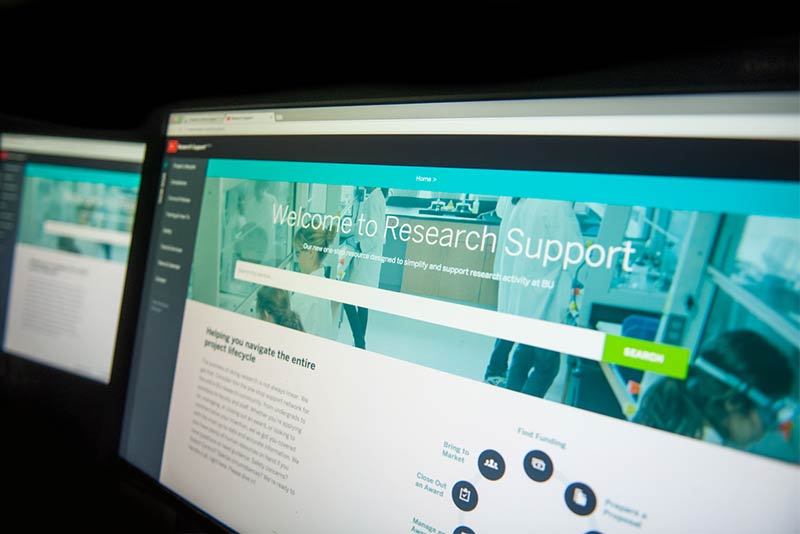University Launches Research Support Website
One hub for everything needed by research faculty and staff

BU’s new Research Support website brings together in one place all the forms and policies needed by faculty, postdocs, graduate students, staff, and administrators to support and conduct research at the University. Photo by Janice Checchio
Boston University has launched a new Research Support website that brings together in one place all the latest information needed to apply for and maintain grants, navigate complex policies, and conduct safe research in compliance with regulations. All of the offices that support research collaborated in developing the site, which is designed for faculty, postdocs, and graduate students, as well as for administrators and staff who help with research at BU.
“The idea is that anything you need to do research at BU is in this one place,” says CJ Hathaway, program director for research communication and documentation in the office of Gloria Waters, vice president and associate provost for research. Hathaway helped lead the effort to create the new website. “This site was built for the research community,” she says, “and is based on their input, and we want ongoing feedback about what’s working—or not working—and what people would like to see on the site.”
“This is a living document,” says Waters. “We want to both improve the site and continually add to it. The most important thing is for users to be able to find the information they need quickly.”
In consolidating information that previously was found on the websites of several offices—including Sponsored Programs, Technology Development, Research Compliance, Animal Care, and the Safety Committees—Research Support streamlines what used to be a time-consuming process of navigating many different sites to find information to apply for grants, comply with regulations, and plow through dozens of forms that were often duplicates and out-of-date. Now all the necessary forms—some 175 of them—are in one place, and unlike in the old system, can all be completed online or downloaded and filled out electronically.
Instead of the old cumbersome organizational charts, information on the new Research Support site is presented according to the natural flow of a research project’s lifecycle and tasks. Guidelines and instructions are easy to read and navigate, beginning with how to find funding and prepare a proposal and continuing through the setting up of an award, conducting research, managing an award, closing out an award, and bringing a breakthrough or product to market. The idea is for researchers to focus more of their time on the work itself and less on the hunt for funding and information.
“This is a living document. We want to both improve the site and continually add to it. The most important thing is for users to be able to find the information they need quickly.” Gloria Waters
“We’d been desperate to clean up our site,” says Diane Baldwin, associate vice president for Sponsored Programs, who was part of the team that launched Research Support. “The way a lot of people interact with us first is online. They want to be able to go online at all hours of the day. They want to be able to find out things quickly, like who do they need to work with.”
When it comes to finding research funding and navigating all the necessary policies, forms, and regulations, says Baldwin, faculty need support from her department and other administrative offices. “You don’t want them focused on all the forms. You want them focused on the science,” she says. “This helps research administrators get information quicker, too, so we’re on the same wavelength with faculty. Now we have access to their forms in a very handy way. We can also share information with our customers—faculty, anyone in our BU community that needs to work with us—in a way we didn’t have before.”
Baldwin notes, however, that as with anything new, the site will require “an adjustment period and a learning period.”
“It’s going to take time,” she says, adding that her office plans to offer training sessions on how to navigate the new site, and that Hathaway will make herself available to anyone who needs help (Hathaway invites feedback and questions at clehr@bu.edu or https://www.bu.edu/researchsupport/contact/feedback/). “When people are looking for something, it’s usually urgent and they get frustrated,” Baldwin says. “Any change requires time and usage. We’re constantly looking for feedback; we can’t stress that enough. We have a wide range of people using the website. What may work for faculty members may not work for an administrator working in the weeds.”
Aimed primarily at University researchers, administrators, and staff, but also meant to be accessible for industry, Research Support is a companion site to Research, the news website that was launched in September 2014 to showcase the depth and breadth of research at the University.
More than two years in the making, Research Support began with a close examination of BU’s online research presence, including in-depth interviews with faculty, administrators, and staff and University-wide user testing to guide the project as it progressed. Hathaway conducted email interviews with more than 40 researchers, who identified the shortcomings of the previous site and its multiple offshoots.
“We had some great suggestions from faculty,” says Baldwin. “You really do need to listen to your customers. Sometimes they can see through the forest when you can’t.”
In collaboration with Waters’ team, the University’s Marketing & Communications also contributed to the effort, starting with a review of the research support–focused sites of 62 of its peer universities in the Association of American Universities. It identified the websites of Stanford University, the University of Michigan, and Northeastern University, among several others, as models.

Comments & Discussion
Boston University moderates comments to facilitate an informed, substantive, civil conversation. Abusive, profane, self-promotional, misleading, incoherent or off-topic comments will be rejected. Moderators are staffed during regular business hours (EST) and can only accept comments written in English. Statistics or facts must include a citation or a link to the citation.